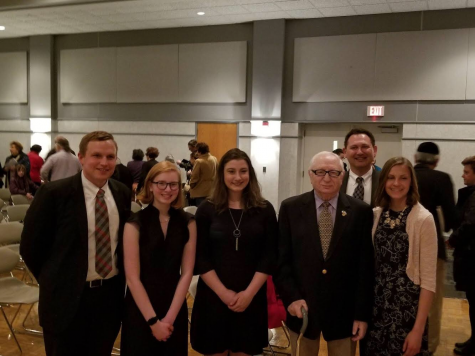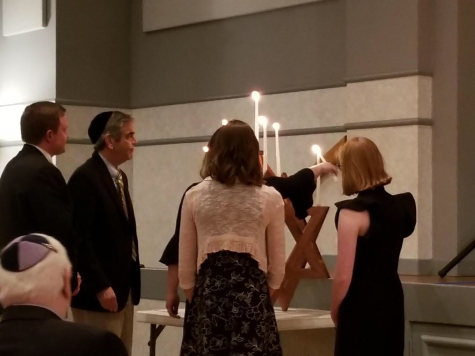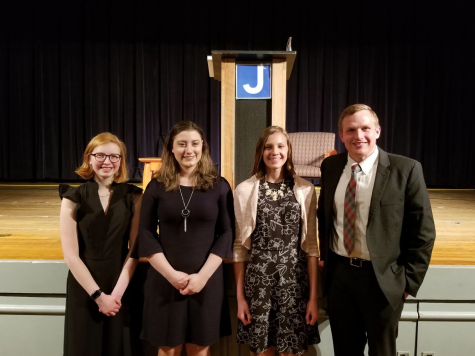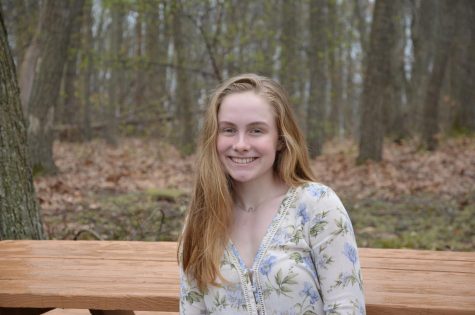Susky Students Win Top 3 in Holocaust Essay Contest
April 22, 2018

Earlier this month, winners of the essay contest hosted by the Yom Hashoah (Holocaust Remembrance Day) Committee of York were announced, and the top three out of 22 essayists were all Susquehannock students.
The essay contest was open to all York County students in grades 9-12, and the topic was about how stories of moral courage during the Holocaust can be applied to today. The essays are made anonymous so that the judges do not know whose essay is whose, and then they are judged.
Freshmen AJ Marusko and Courtney Burgess came in third and second, and sophomore Annie Hebel came in first.
Burgess was happy to have placed at all and enjoyed the experience of writing the essay and going to a church service.
“I think it’s pretty cool, because as a freshman I think it was cool that I even placed, and there were 22 people that entered, so I thought it was pretty good that I got second,” said Burgess. “I think it’s important to remember what people experienced and to think about it from their perspective. You can’t just assume anything.”
Each finalist got to attend the Yom Hashoah Memorial Service at the JCC.
Hebel describes the event that they participated in.

“It was really neat, they started out with a Jewish service, like a church service type thing, so they read out their prayers in Hebrew, they sang, and it was really interesting because I’d never been to a Jewish service before, so that was a really cool cultural experience, and then they announced the winners,” said Hebel. “Before they announced the winners, they had candles, and they let everyone who was a Holocaust survivor, a child of a Holocaust survivor, and the essay finalists light a candle, so that was really cool.”
“It was definitely something I had never been able to experience before, I had heard a Holocaust survivor speak before, but I never actually got to go up and meet one, and all the essay winners got to go up and meet him afterwards, which was really cool,” said Marusko. “It was just interesting because while we were there to get an award, it’s not like we were the center of attention which is what I thought we were going to be.”
Burgess wrote a research paper from a more general perspective of the Holocaust, and how it widely affected people. Marusko and Hebel focused more on the smaller stories of the Holocaust, and specific people who exhibited moral courage.
Hebel based her essay on a specific Holocaust survivor who published memoirs, gave talks, and won a Nobel Prize for his efforts to make sure no one forgot the Holocaust.
“It really kind of wrote itself… I read his [Elie Wiesel’s] essay, called ‘Hope to Spare a Memory’ and I actually ended up hanging it on my wall because I read his essay and it just spoke to me. The day I came up with the idea, I was feeling really uninspired, I don’t remember why, and I just thought, ‘I should go read that essay again,’ because it’s super inspiring, I encourage everyone who’s reading this article to go look it up and read it, you can find it for free online,” said Hebel. “I was feeling really down, and I just went and reread it, and I was like ‘this is a great essay, I could write a piece on this, and it’s perfect for that essay,’ so that’s kind of how it fell into place.”
Since Hebel won, she got to speak her essay at the memorial service, and received many compliments about her speech.

“I think the coolest part was that afterwards, so many people came up to me and told me how my words moved them, a bunch of people started crying which was crazy, a Holocaust survivor gave me her contact information, we went out for dessert afterwards and some people actually came up to us who went to the event and paid for our dessert, so that was crazy, it was really kind of a blur after that, but then the Holocaust speaker, his story was so interesting, it was really inspiring, it was really a cool night,” said Hebel.
After attending the event, Marusko left with a greater appreciation for the events and survivors of the Holocaust.
“What I’m gonna take away from it is that there are so many great stories from the Holocaust, stories of moral courage which was our topic that the three of us tried to cover, but weren’t able to because it was just so overfilling almost, and these are stories that should not be forgotten because they are so important to not only today’s history, but just in general the world’s history,” said Marusko.
After writing her essay, Hebel was reminded of how powerful words are, and how important it is to stand up for what you believe in.
“The theme of my essay was basically about how words are so powerful and how he used words to protest the injustices that he went through. So definitely taking away that speaking and writing are always going to be the most powerful form of protest there is, and that kind of worked with my speech too, because I was speaking at an event that was against these things, and the theme of my essay was about speaking out against injustice, so it just kind of all fit together really well,” said Hebel. “I’ll definitely take away the stories that I heard from people that night. We don’t even think about it, but imagine having to live with the memory of you or someone you love going through such terrible torture as a child, and just what they went through, it’s just crazy to think about, and I think it’s often forgotten, so definitely that, always keeping that on my mind.”




